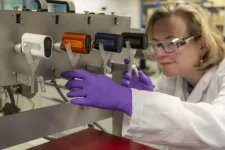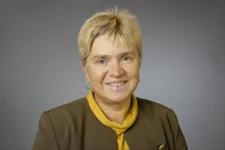(Press-News.org) As the COVID-19 pandemic exploded across the globe in early 2020, the world's leaders were faced with a flurry of tough moral dilemmas. Should schools and businesses shut down, and if so, for how long? Who should receive scarce resources, such as ventilators, when there wouldn't be enough for everyone? Should people be required to practice contact tracing to control the spread of infection? Should life-saving medicine be held for a country's own citizens or shared with those in greater need?
Some global leaders advocated for a utilitarian approach to these dilemmas: impartially maximizing the greatest good for the greatest number of people, even if that would come at the cost of harming a minority of the population. Utilitarianism, however, is a controversial way of making moral decisions and those who use this approach might not be viewed as trustworthy.
In a new study, Molly Crockett, an associate professor of psychology at Yale, examined whether people trust leaders who make utilitarian decisions during a pandemic. To find out, she and her co-first authors -- Yale's Clara Colombatto and the University of Kent's Jim Everett -- assembled a multidisciplinary team of 37 international researchers to study people's trust in leaders around the globe. In a series of online experiments conducted as cases surged late in 2020, the team asked nearly 24,000 people in 22 countries whether the endorsement or rejection of utilitarian policies impacted their trust in leaders.
The results, published July 1 in the journal Nature Human Behavior, show people had a nuanced view when judging the policy decisions of leaders. People tended to trust utilitarian leaders who sought to save the most lives around the globe, rather than favoring their own citizens. But they were far less willing to trust those whose policy decisions would sacrifice the well-being of some for the benefit of others.
For instance, a shortage of ventilators led some leaders to propose reserving them for younger people more likely to survive a severe case of COVID-19. People tended to distrust leaders who accepted this form of utilitarianism, known as instrumental harm. However, they bestowed more trust in those who would share scarce medicine in regions globally where it is most needed, an aspect of utilitarianism called impartial beneficence.
The results were consistent across the countries studied, which included Australia, Brazil, Canada, Chile, China, Denmark, France, Germany, India, Israel, Italy, the Kingdom of Saudi Arabia, Mexico, the Netherlands, Norway, Singapore, South Africa, South Korea, Spain, the United Arab Emirates, the United Kingdom, and the United States of America.
These patterns held regardless of whether or not people personally agreed with the leader's policy decision. "People do prefer leaders who agree with them on policies, but even after we control for individual policy preferences, people generally trust leaders who endorse impartial beneficence and distrust leaders who accept instrumental harm," said Colombatto, a Ph.D. student in the Department of Psychology.
Everett concluded, "When communicating during a crisis, leaders should be aware that utilitarian approaches to moral dilemmas can both erode and enhance trust -- even when the leaders themselves doesn't have the power to resolve them."
Pandemic choices: Do you trust leaders who make these?
Researchers asked almost 24,000 people in 22 countries to read about moral dilemmas leaders faced during the COVID-19 pandemic. Two examples of those tough moral choices are below. After learning about the leaders' decisions, respondents were asked to rate how trustworthy they thought those leaders were, and to make decisions about whether to trust each leader with control of a group's financial resources. Subjects were also asked whether they would vote for a leader who took a particular policy position.
A demonstration of the trust rating survey is available here:
https://yalesurvey.ca1.qualtrics.com/jfe/form/SV_ekzXerwo4NHMzyK
Medicine Dilemma
Non-Utilitarian Leader
Imagine that the mayor of a major city in your region is arguing that U.S.-made medicine should be reserved for treating American citizens.
This mayor said, "We have a right to use our own resources to help our own citizens before everyone else. Other countries can produce their own treatments for COVID-19."
Average self-reported trust: 3.93 out of 7; votes: 38.93%
Utilitarian Leader
Imagine that the mayor of a major city in your region is arguing that U.S.-made medicine should be given to whoever needs it most, even if that means sending it to other countries.
This mayor said, "COVID-19 is a global pandemic that affects all humans equally. We need to be impartial and send treatment where it can achieve the greatest good."
Average self-reported trust: 4.57 out of 7; votes: 61.07%
Ventilators Dilemma
Non-Utilitarian Leader
Imagine that the mayor of a major city in your region is arguing that doctors should give everyone equal access to COVID treatment.
This mayor said, :It's not our place to choose who lives. Everyone has the same right to receive equal access to treatment, and we cannot abandon our most vulnerable in an effort to save more lives."
Average self-reported trust: 5.41 out of 7; votes: 85.15%
Utilitarian Leader
Imagine that the mayor of a major city in your region is arguing that younger and healthier people should be prioritized for COVID treatment.
This mayor said, "We have to think about how we can do the most good with the resources we have, and that means prioritizing those people who have the best chance of recovering and living a long and healthy life."
Average self-reported trust: 2.97 out of 7; votes: 14.85%
INFORMATION:
1 July 2021: Despite only limited evidence that fertility add-ons increase the odds of having a baby, the majority of women (82%) have used one or more of these treatments as part of their IVF.
This is the conclusion of a retrospective study of 1,590 Australian patients which also found more than seven in 10 (72%) had incurred additional costs for these unproven additional therapies and techniques which range from Chinese herbal medicine to endometrial scratching.
The results based on an online survey into prevalence of these optional extras will be presented today by principal investigator Dr Sarah Lensen, a researcher from the University of Melbourne, Australia, at the 37th virtual Annual Meeting of ESHRE.
The findings, says Lensen, suggest ...
Bottom Line: For women diagnosed with breast cancer in Florida, breast cancer-specific mortality rates have decreased more among Black and Hispanic women than white women since 1990. Despite these advances, Black women still have double the five- and 10-year mortality rates of non-Hispanic white women.
Journal in Which the Study was Published: Cancer Epidemiology, Biomarkers & Prevention, a journal of the American Association for Cancer Research.
Author: Robert Hines, PhD, MPH, associate professor of population health sciences at the University of ...
Evidence shows significant reduction in indicators of potential harm over 6-months for smokers switching to exclusive use of glo compared with continuing to smoke cigarettes
Gold-standardi indicator supports scientific substantiation of glo's potential as a reduced risk product*
First ever long-term study showing sustained reduction in exposure to certain toxicants and indicators of potential harm in smokers switching completely to glo
Supports BAT's delivery of A Better TomorrowTM by reducing the health impact of its global business by encouraging ...
New research from marine biologists offers answers to a fundamental puzzle that had until now remained unsolved: why are some fish warm-blooded when most are not?
It turns out that while (warm-blooded) fish able to regulate their own body temperatures can swim faster, they do not live in waters spanning a broader range of temperatures.
The research therefore provides some of the first direct evidence as to the evolutionary advantage of being warm-blooded as well as underlining that species in this demographic - such as the infamous white shark and the speedy bluefin tuna - are likely just as vulnerable to changing ...
Nanosized molecules of a particular chemical element can inhibit the formation of plaque in the brain tissues. This new discovery by researchers at Umeå University, Sweden, in collaboration with researchers in Croatia and Lithuania, provides renewed hope for novel treatments of, for instance, Alzheimer's and Parkinson's disease in the long run.
"This is indeed a very important step that may form the basis of new and efficient treatments of neurodegenerative diseases in the future," says Professor Ludmilla Morozova-Roche at Umeå University.
When proteins misfold they form insoluble fibrils called amyloids, which are involved in several serious diseases such as Alzheimer's and Parkinson's, Corino de Andrade's and the mad cow ...
SAN ANTONIO (June 30, 2021) -- In a U.S. and Swiss study, nearly all patients with cancer developed good immune response to the COVID-19 mRNA vaccines three to four weeks after receiving their second dose, but the fact that a small group of the patients exhibited no response raised questions about how their protection against the virus will be addressed moving forward.
Among the 131 patients studied, 94% developed antibodies to the coronavirus. Seven high-risk patients did not. "We could not find any antibodies against the virus in those patients," said Dimpy P. Shah, MD, PhD, of the Mays Cancer Center, home to UT Health San Antonio MD Anderson. "That has implications for the future. Should we provide a third dose of vaccine after cancer therapy has completed ...
Expanding symptom list in line with other countries could improve the UK's pandemic response
The UK should expand its official list of symptoms for defining covid-19 to prevent cases being missed and help improve the UK's pandemic response, say experts in The BMJ today.
They argue that limiting symptomatic testing to those with these official symptoms "will miss or delay identification of many covid-19 cases, hampering efforts to interrupt transmission."
During the covid-19 pandemic the British public has been told to self-isolate and get a test if they have a high fever, a new continuous cough, or ...
Eating a diet rich in omega 3 (n-3) fatty acids reduces the frequency of headaches compared with a diet with normal intake of omega 3 and omega 6 (n-6) fatty acids, finds a study published by The BMJ today.
Modern industrialised diets tend to be low in omega 3 fatty acids and high in omega 6 fatty acids. These fatty acids are precursors to oxylipins - molecules involved in regulating pain and inflammation.
Oxylipins derived from omega 3 fatty acids are associated with pain-reducing effects, while oxylipins derived from omega 6 fatty acids worsen pain and can provoke migraine. But previous studies evaluating omega 3 fatty acid supplements for migraine have been inconclusive.
So a team of US researchers wanted to find out whether diets ...
A diet higher in fatty fish helped frequent migraine sufferers reduce their monthly number of headaches and intensity of pain compared to participants on a diet higher in vegetable-based fats and oils, according to a new study. The findings by a team of researchers from the National Institute on Aging (NIA) and the National Institute on Alcohol Abuse and Alcoholism (NIAAA), parts of the National Institutes of Health; and the University of North Carolina (UNC) at Chapel Hill, were published in the July 3 issue of The BMJ.
This study of 182 adults with frequent migraines ...
New research being presented at this year's European Congress of Clinical Microbiology & Infectious Diseases (ECCMID) being held online (9-12 July) identifies drugs that could potentially be repurposed for the treatment of gonorrhoea (Neisseria gonorrhoeae [Ng]): a sexually transmitted infection which is becoming increasingly resistant to existing antibiotics.
The decreased susceptibility of the Ng bacterium to extended spectrum cephalosporin antibiotics has become an important public health issue as cases of this common infection become more difficult to treat.
The study ...



